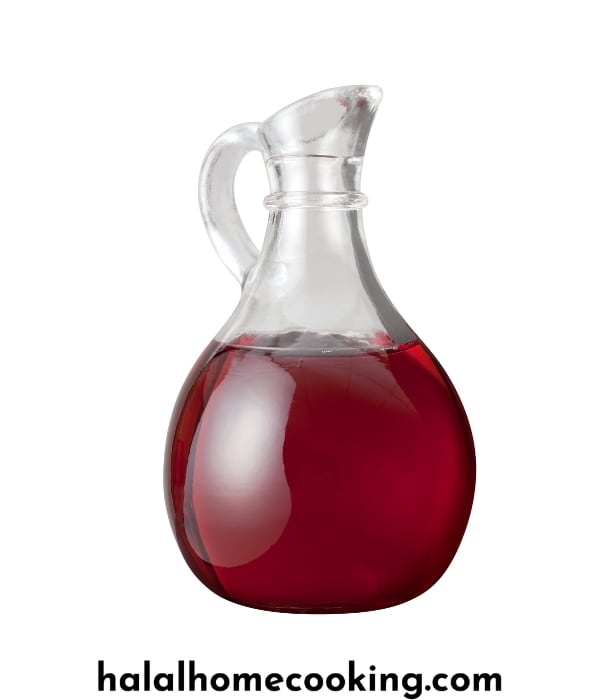In the world of culinary exploration, vinegar is a staple ingredient that adds depth and flavor to our dishes. From rice vinegar to apple cider vinegar, we rely on this tangy elixir for its distinct taste and versatility. However, when it comes to the question of whether wine vinegar is halal or not, different opinions and interpretations arise among Muslims worldwide.
Wine vinegar can be produced using various methods, with rice wine vinegar being one popular type. It is created by fermenting rice into alcohol through a process known as acetic fermentation. This alcoholic solution is then transformed into acetic acid, resulting in the tangy rice wine vinegar we know and love.
Similarly, white wine vinegar and red wine vinegars are made from converting grape juice or red wine respectively through the same acetic fermentation process. Balsamic vinegars undergo further aging in wooden barrels which give them their distinctive flavors.
Now why all this talk about fermentation and conversion? Well, it’s because within Islamic dietary guidelines (halal), consuming any form of alcohol – present even in trace amounts – is strictly prohibited. This has led to discussions among Islamic scholars about whether or not these types of vinegars are permissible for consumption.
Firstly, what does the Prophet Muhammad (peace be upon him) say about consuming such ingredients? In a narration found in Sahih Muslim [5254], Prophet Muhammad states: “Whatever intoxicates in large quantities – a small quantity of it would also intoxicate.” This hadith provides clear guidance regarding substances that have an intoxicating effect on humans.
Applying this understanding to wines used as raw materials for producing vinegars raises concerns regarding their purity after undergoing fermentation processes. Since alcoholic beverages go against Islamic teachings due to their potential effects on human consciousness when consumed excessively, some Muslim scholars assert that their derivatives like wine vinegars are also Haram (forbidden).
However, there is a differing perspective among certain Islamic scholars who argue that the fermentation process transforms the alcohol into acetic acid. According to them, this conversion makes wine vinegar halal for consumption since it no longer retains its original intoxicating properties.
In light of these divergent opinions and interpretations, it becomes essential for individuals to make an informed decision based on their personal beliefs and the advice of trusted religious authorities.
Checkout: Is Rice Wine Vinegar Halal?
To further complicate matters, the label “wine vinegar” itself can be misleading because not all vinegars labeled as such are made from alcoholic wines. Some commercially available wine vinegars undergo a distillation process using heat or other methods to remove any trace amounts of remaining alcohol content. These distilled white vinegars can act as suitable alternatives in recipes where one would typically use rice wine or white wine vinegars.
Additionally, alternative forms of vinegar include malt vinegar and cider vinegar (made from apple juice). These variations have been determined by many Muslim scholars to be permissible due to their production methods not involving grapes or alcoholic beverages.
Ultimately, determining whether a particular type of vinegar is halal requires careful examination of its ingredients and manufacturing processes. Reading labels thoroughly and seeking guidance from knowledgeable sources will aid in making informed choices when incorporating these tangy liquids into our meals.
Is Wine Vinegar Halal in Sunni?
In Sunni Islam, wine vinegar is considered halal. This includes all types of vinegar derived from wine such as red wine vinegar and white wine vinegar. The process of acetic fermentation converts the alcohol in the wine into acetic acid, removing its intoxicating properties. Islamic scholars have determined that the alcohol content in these vinegars becomes negligible and does not pose a risk of intoxication. Therefore, Muslims can consume rice wine vinegar or any other type of vinegar made from fermented grapes without violating Islamic dietary laws.
Is Wine Vinegar Halal in Shia?
In Shia Islam, wine vinegar is considered halal. The process of making wine vinegar involves acetic fermentation, where the alcohol in the wine turns into acetic acid. This fermentation process removes the impurities and transforms it into a permissible substance. Therefore, even though the ingredient used to make wine vinegar is initially haram (wine), it becomes halal after undergoing this transformation. Islamic scholars have also mentioned that Prophet Muhammad (peace be upon him) allowed saadiqah aaisha to use vinegar made from red or white grapes. Furthermore, other types of vinegars such as cider vinegar and rice vinegar are also considered halal in Shia Islam since they are not derived from alcoholic beverages but rather from apple juice or fermented rice respectively.
Is Wine Vinegar Halal in Hanafi?
In the Hanafi fiqh, wine vinegar is considered halal. This includes all types of vinegar derived through acetic fermentation, such as rice wine vinegar, white wine vinegar, red wine vinegar, and balsamic vinegar. The process of acetic fermentation involves converting alcohol into acetic acid by the action of bacteria called Acetobacter. Therefore, regardless of its source (such as red wine or white wine), if the alcohol content has been transformed into acetic acid during the fermentation process, it is permissible to consume it according to Hanafi scholars. Prophet Muhammad’s wife Saaidah Aaisha reported that he used to use sour milk and diluted grape juice as a type of condiment similar in flavor to modern-day vinegars (Sahih Muslim).


